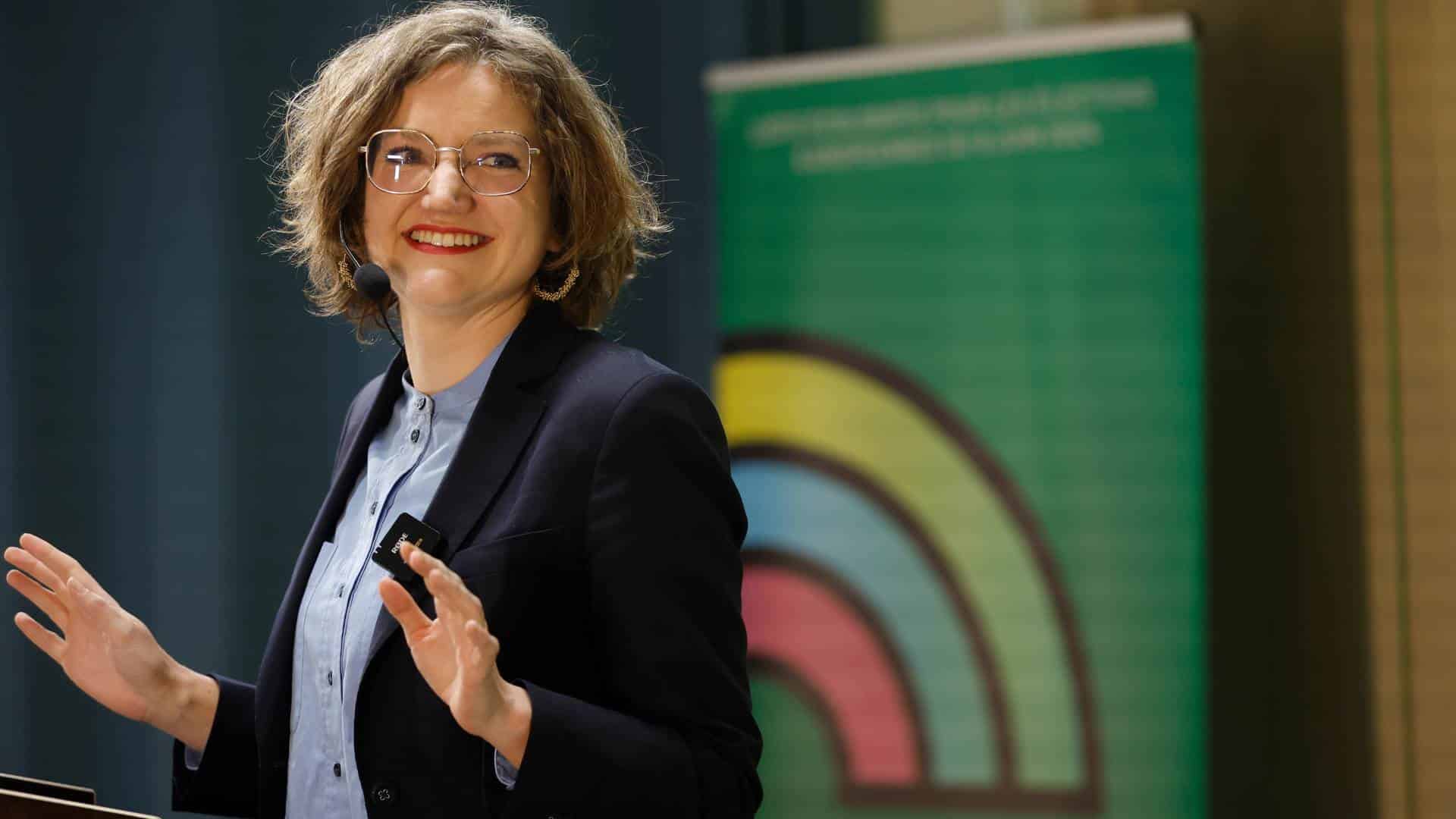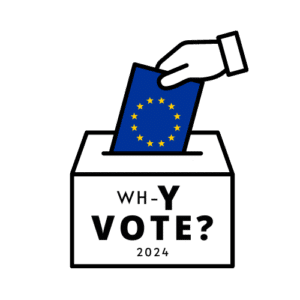Freedom to travel across borders comes with EU citizenship. But will la jeunesse travel across town to vote as Europeans?

French Green Party candidate for the European Elections Marie Toussaint speaks during a campaign rally in Strasbourg, France, 25 April 2024. The Greens are counting on a high youth vote. (AP Photo/Jean-Francois Badias)
Editor’s Note: Between 6 and 9 June, voters in all 27 countries of the European Union will go to polls to select representatives of the 700+-member European Parliament, the only directly elected transnational assembly in the world.
The last EU election, in 2019, saw the first increase in voter turnout in 40 years. The leap to just over 50% was largely thanks to a so-called ‘youth surge’: namely a 12% increase in turnout among 25 to 39-year olds and a 14% increase among the under 25s.
Senior EU figures heralded the result as a new era of civic engagement and evidence of strengthened support for the EU. Yet, even with the increase, only half of eligible voters cast a ballot and turnout actually decreased in eight countries.
The 2024 election will include, for the first time, 16-year olds in Germany and Belgium, joining their Maltese and Austrian counterparts who were granted the vote in the 2000s.
News Decoder’s Wh-Y Vote series, which launches today, aims to shed light on these questions by examining how young people across the European Union feel about the upcoming election. What influence do they believe the EU has on their lives? Why are young people voting or not voting? What are the issues driving them to or away from the polling station?
Correspondents based in France, Denmark, Hungary, Latvia and Poland have sought the views of young voters and non-voters as well as election experts in their respective countries and, over the course of five articles, will paint a nuanced and candid portrait of the state of the youth vote in the run up to polling day.
To kick off the series we go to Lyon, France with correspondent Carlos Rubio.
The European elections are seen as a major test both for French President Emmanuel Macron midway through his second presidential term and the city of Lyon, in particular. But you don’t get that sense among university students in Lyon.
Lyon is France’s third largest city. Governed by the strongly pro-European Green Party, The Ecologists, the self-referred “Gastronomic capital” of France is trying to make sure through public information campaigns that everyone gets registered to go to the polls on 9 June, with the hope of building on its success of 2019.
That year, The Ecologists drew 13.5% of the vote after polling below 10% during the whole campaign. The following year, in the 2020 municipal elections, they led the country with a “green wave” that took control of many of France’s large municipalities.
In most other French cities the extreme right party of Marine Le Pen is expected to win. But in Lyon, a city of more than a million people where nearly 15% of its population are university students, second only to Paris, the old EELV “Europe Ecology — The Greens” is relying on its strong youth support.
I went to one of the city’s leading universities, the École Normale Superieure to speak to some students to see what they felt about the forthcoming elections and found a small cohort gathered outside the main library building.
University students ponder voting.
Fatima is an Italian economics student doing an exchange year in Lyon, who said she believes in the European project. But she only found out about the elections after receiving a letter from her embassy with information about vote registration.
Nevertheless, she plans to vote, mainly to stop the advancement of the extreme right in the continent, which already runs her government at home.
She confessed not knowing much about European politics, even less about the political situation in France, but felt that the extreme right nationalistic and populistic policies go against the heart of the European project.
Next to her, two French law students said they will vote.
“Yes, we know there are elections, but we are not interested,” said one. When asked why, they said they had better things to worry about.
Reasons to vote
A French philosophy student said that she planned to vote in the elections mostly to stop the extreme right, as her friend standing next to her nodded.
This was a reason several others gave me, and it seems to be a major motivator in mobilising the youth vote, at least in France, where the National Rally (or Rassemblement National in French) is widely expected to win these elections, as they did in 2019. This time, their lead over second-placed favourites, Macron’s party, is expected to widen.
When asked, the French students said they each felt more French than European, though none gave their national identity much importance and two even said they didn’t particularly feel proud of it.
📣 FOUR REASONS WHY YOUR VOICE ON EUROPEAN ISSUES MATTERS 📣
1. Your freedom of movement
All citizens of EU member countries have the ability to live and work and travel freely anywhere in the EU.
2. Your education
The European Union allows its citizens to study at any EU university under the same conditions as nationals. Under the ERASMUS program, the EU spend 1.2 billion euros for university students to study in other countries. In 2022 alone, some 372,000 students took advantage of this program.
3. Your money
The politicians elected in the European Parliament help shape the EU budget deciding what issues to prioritise. The European Union has allocated 50 billion euros for Ukraine assistance and 118 billion euros for climate change initiatives. For youth in particular, the EU funds employment schemes, regional development programmes and urban regeneration projects.
4. Your rights
In March the European Parliament passed a law that would ban artificial intelligence applications that violate citizen rights to privacy and their identities, such as the scraping of CCTV footage for facial recognition, and it would require transparency when AI is used. A new policy is pending approval by member states that would force manufacturers to provide easy ways to get products repaired and allow third parties access to spare parts needed to repair broken or damaged products.
But at the same time, they expressed no knowledge about European politics, nor any particular identification with a European identity or the so-called “European project”.
A common complaint I heard among French university students is that there is no information about the EU or European politics “out there” or in the media.
This has been said for many years now. The European Union is often accused of failing to reach out to European citizens and voters in general. It seems to be incapable of winning the hearts and minds of the average European citizen.
But it doesn’t take much effort to realize the amount of tools and resources available, at least to French students, from European institutions all over the city and university campus.
What Europe offers
A large city like Lyon, not far from Italy and Germany (and Switzerland) offers all types of “European experiences” to its young population, besides the well-known Erasmus program, which funds internships and studies abroad.
These include film festivals, cultural centres, mobility programs and many types of transnational exchanges and experiences within Europe. Even if Lyon is not a truly international metropolis or as European as Paris or Strasbourg, there is a lot of Europe in this city.
Students might have a valid complaint regarding the media, not just the local press and radio stations, but even the national media in France.
There is little coverage of European parliamentary affairs in French news outlets, and what is there tends to assume a previous knowledge of European affairs in the audience. Something clearly not present for many young eligible voters.
Hardly anyone I asked had ever heard of EU President Ursula von der Leyen or European Commission President Charles Michel.
A few months ago, I did a general media knowledge quiz among a small group of media and advertising students, and two of them gave numbers above 100 when asked how many nations formed the European Union! (The answer is 27.)
Apathy and inertia
Young voters claim to be interested in current affairs, support so-called European social values and reject the increasing influence of the extreme right in politics.
But their lives are too busy, they say, to follow European politics. They have classes, homework, housing problems and jobs. How can they be expected to know what’s happening in Europe?
Like any old-time note-pad-carrying journalist, I answer: How many hours a day do you spend on your phone?
Responses average between three to six hours, but my advice is always the same: Take two hours off your weekly phone time to devote to following and understanding European politics and how they affect your life.
It is your responsibility as young citizens of your country to seek out information and find the relevance it has in your lives and in that of your community.
And then, just to make my student friends feel a little bit better about themselves, I end up my short lecture telling them that, certainly, the media can and should do better in covering and educating about European affairs.
Three questions to consider:
- In what ways is the European Union important to a young French voter?
- What reasons do some French youth give for not voting in Europe’s election?
- Do you think you should be able to vote for representatives of international organizations like the United Nations?

Carlos Rubio is an international journalist who has lived and worked in 15 countries on five continents. He has held senior positions in the newsroom and in the field, both in print and broadcast media. Rubio was Australia correspondent for the Spanish news agency EFE and a news editor with Al Jazeera English in Qatar and with Euronews in Lyon. Rubio has four degrees — in journalism, development studies, refugee studies and Asian politics — from universities in London, Sydney and Madrid. He currently teaches at journalism schools in France and is a board member of Nouvelles-Découvertes, the French nonprofit that governs News Decoder.
Wh-Y Vote 2024 is funded by the European Union. Views and opinions expressed are however those of the author only and do not necessarily reflect those of the European Union or the Directorate General for Communications Networks, Content and Technology. Neither the European Union nor the granting authority can be held responsible for them.


